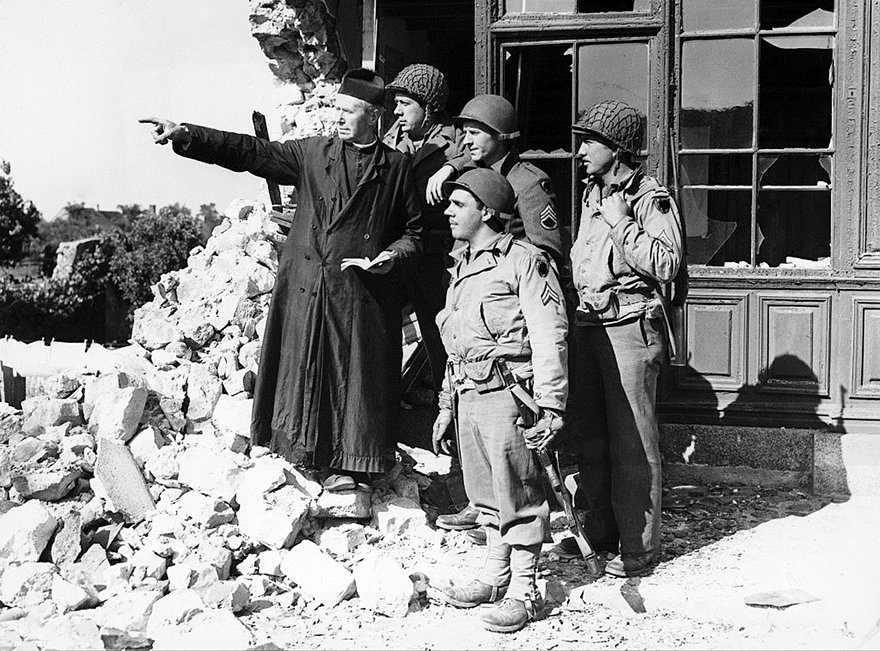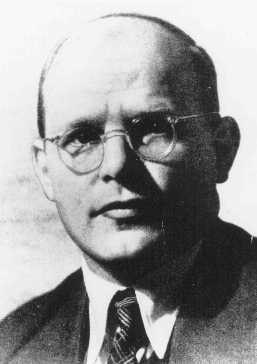
The Ecumenism of Blood
A personal reflection on sacrifice as a foundation of ecumenism by Dr Ian Watson, County Ecumenical Officer for Norfolk and Waveney
Recently, I read a rollicking good account of those who sacrificed so much to fight the fascists in World War II. I would certainly recommend it as a well researched and entertaining read. It is called Priests de la Resistance! The Loose Canons Who Fought Fascism in the 20th Century, by Rev Fergus Butler-Gallie.
The book reminded me that ecumenism often comes to the fore in times of great difficulty, persecution and self-sacrifice. Pope Francis recognises this as a foundation for ecumenism. When addressing the World Council of Churches in 2018, he said: “May we never forget that our ecumenical journey is preceded and accompanied by an ecumenism already realised, the ecumenism of blood, which urges us to go forward [as Christians together]”.
I think he is right. I recently delivered a talk for my village to mark D-Day 80. During my research, I came across the most remarkable stories of the bravery and sacrifice of so many in battle who had dedicated their lives to our Lord Jesus. It is an interesting, if not shocking, fact that during and following Operation Overlord (the operation to retake Normandy), over twenty-five Chaplains were killed or reported missing.
As a young man, I was a serving frontline infantryman, and I can think of no braver people than those, alongside me and my fellow comrades, who went into conflict armed only with the bible, and the body and blood of Christ. During WWII, the chaplains who made the ultimate sacrifice came from different denominations. Their pastoral care was given with love to all and without discrimination.
More recently I was listening to a podcast called ‘When we Prayed - Miracles of WWII’. I would highly recommend you check out this entertaining two-part podcast. There was one event recalled that especially struck me from an ecumenical standpoint: ‘the miracle of Dunkirk’.
As most of you will know, Dunkirk is an enthralling and thought-provoking story. Despite being surrounded by enemies and facing annihilation, the British Army and other Allied forces managed to escape to safety across the English Channel. This miraculous event, reminiscent of the biblical Exodus, continues to captivate today. In May 1940, Hitler's military onslaught trapped the Allied forces with their backs to the sea. The German High Command believed they would annihilate the British Army, and even the military and political leaders of Britain feared the worst. However, on May 23rd, King George VI and Churchill called for a National Day of Prayer, and the decision was made to evacuate as many soldiers as possible. The nation fervently prayed, Hitler paused his ground assault (but not air), and boats of all sizes and shapes came forward to rescue the besieged army. Approximately 800 vessels answered the call.
What was amazing is that during the National Day of Prayer people reported worshipping alongside others from different denominations for the first time in living memory. No doubt in todays largely secular society there would be much scepticism linking the National Day of Prayer with the ‘miracle’ of Dunkirk. Well, I am not too sure they are right to be so sceptical. For me, Dunkirk serves as a powerful reminder to have faith and pray more together despite the denomination or tradition we belong to. No matter how big our divisions and problems may seem, God is greater. The message of prayer from Dunkirk applies to every aspect of life, from small personal crises to national or international disasters. Dunkirk should be remembered not only as a military epic but also as a source of ecumenical encouragement to pray together.
I have also been reading the biography of Dietrich Bonhoeffer, who was a German Lutheran pastor, theologian and anti-Nazi dissident who was a key founding member of the Confessing Church. His writings on Christianity’s role in the secular world have become widely influential through his 1937 book The Cost of Discipleship. 
I am interested in Bonhoeffer because his approach to ecumenism reflects the contemporary view of what we call Receptive Ecumenism and, I should say, the approach to Christian unity adopted by Churches Together in Norfolk and Waveney (NWCT). Receptive Ecumenism is centred on Jesus and the Gospel. It is both a way of thinking and a process that enables Christian unity to be built through relationships and by receiving gifts from others. It challenges us to not think of what others might benefit from receiving from us, but instead invites us to recognise our needs and to put ourselves in the place of being a recipient.
Bonhoeffer was a remarkable figure whose achievements, sacrifice, and views on ecumenism continue to inspire and resonate with people today. Born on February 4, 1906, in Breslau, Germany, Bonhoeffer grew up in a family that valued education, faith, and social justice. These values shaped his life and ultimately led him to become one of the most influential theologians and thinkers of the 20th century.
One of Bonhoeffer's notable achievements was his active role in the Confessing Church, a movement that opposed the Nazi regime’s attempts to control and influence the German Protestant Church. Bonhoeffer firmly believed that the church had a responsibility to resist injustice and stand up for those who were marginalised and persecuted. He actively worked against the Nazi ideology and its influence on the church, advocating for a church that remained faithful to its Christian principles.
Bonhoeffer's commitment to his beliefs ultimately led to his sacrifice. As the Nazi regime tightened its grip on Germany, he became involved in resistance activities against Hitler. He participated in a plot to assassinate Hitler and was eventually arrested, imprisoned and hanged in a concentration camp. As he was being dragged away his last words to a fellow prisoner was ‘For me this is the beginning of life.’ Before being executed he knelt, quietly prayed and commended his soul to God. The Nazis then hanged him with piano wire.
Despite facing immense pressure and the threat of death, Bonhoeffer remained steadfast in his convictions. His unwavering faith and courage in the face of adversity are a testament to his faith in Christ and his remarkable character.
Regarding ecumenism, Bonhoeffer held a nuanced view. While he recognised the importance of Christian unity, he also emphasised the need for a genuine and meaningful ecumenism that respected and learned from different denominations.
He believed, as I do, that true unity should not be achieved at the expense of compromise or diluting core theological principles. Bonhoeffer advocated for a unity that was rooted in Jesus, a shared understanding of the gospel and a commitment to justice and love. He believed that genuine ecumenism required prayer, engagement and dialogue, where different traditions could learn from each other and foster a deeper understanding of God's truth.
For me, Dietrich Bonhoeffer's life and work exemplify the power of faith, courage, and conviction. His achievements in the face of adversity, his sacrifice for what he believed in, and his nuanced views on ecumenism continue to inspire and challenge us today.
Bonhoeffer's legacy serves as a reminder that even in the darkest of times if, together, we stand up for justice, stay true to our core Christian principles, and seek unity in diversity, these are values worth pursuing and upholding. As Pope Francis points out the ecumenical journey is preceded and accompanied by an ecumenism already realised, the ecumenism of blood and sacrifice, which urges us to go forward as Christians together.
For more information on Bonhoeffer click here.
Photos. Main picture courtesy of World War II pictures: https://x.com/WWIIpix. Picture in body of text of Dietrich Bonhoeffer, German Protestant theologian who was executed in the Flossenbürg concentration camp on April 9, 1945. Germany, date uncertain: courtesy of DIZ Muenchen GMBH, Sueddeutscher Verlag Bilderdienst.
Article by Dr Ian Watson